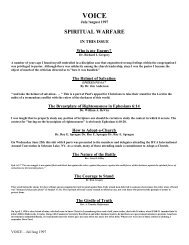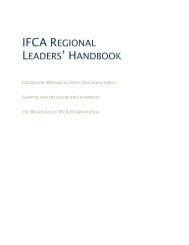The Joyful Burden
The Joyful Burden
The Joyful Burden
You also want an ePaper? Increase the reach of your titles
YUMPU automatically turns print PDFs into web optimized ePapers that Google loves.
ones. Here they are, roughly in the order they occurred to me. This is what is wrong with<br />
superficial, marginally biblical preaching:<br />
1. It usurps the authority of God over the soul. Whether a preacher boldly proclaims the Word of<br />
God or not is ultimately a question of authority. Who has the right to speak to the church? <strong>The</strong><br />
preacher, or God? Whenever anything is substituted for the preaching of the Word, God's<br />
authority is usurped. What a prideful thing to do! In fact, it is hard to conceive of anything more<br />
insolent that could be done by a man who is called by God to preach.<br />
2. It removes the lordship of Christ from His church. Who is the Head of the church? Is Christ<br />
really the dominant teaching authority in the church? If so, then why are there so many churches<br />
where His Word is not being faithfully proclaimed? When we look at contemporary ministry, we<br />
see programs and methods that are the fruit of human invention; the offspring of opinion polls<br />
and neighborhood surveys; and other pragmatic artifices. Church-growth experts have in essence<br />
wrested control of the church's agenda from her true Head, the Lord Jesus Christ. Our Puritan<br />
forefathers resisted the imposition of government-imposed liturgies for precisely this reason: they<br />
saw it as a direct attack on the headship of Christ over His own church. Modern preachers who<br />
neglect the Word of God have yielded the ground those men fought and sometimes died for. When<br />
Jesus Christ is exalted among His people, His power is manifest in the church. When the church is<br />
commandeered by compromisers who want to appease the culture, the gospel is minimized, true<br />
power is lost, artificial energy must be manufactured, and superficiality takes the place of truth.<br />
3. It hinders the work of the Holy Spirit. What is the instrument the Spirit uses to do His work?<br />
<strong>The</strong> Word of God. He uses the Word as the instrument of regeneration (1 Pet. 1:23; James 1:18).<br />
He also uses it as the means of sanctification (John 17:17). In fact, it is the only tool He uses (Eph.<br />
6:17). So when preachers neglect God's Word, they undermine the work of the Holy Spirit,<br />
producing shallow conversions and spiritually lame Christians--if not utterly spurious ones.<br />
4. It demonstrates appalling pride and a lack of submission. In the modern approach to<br />
"ministry," the Word of God is deliberately downplayed, the reproach of Christ is quietly<br />
repudiated, the offense of the gospel is carefully eliminated, and "worship" is purposely tailored to<br />
fit the preferences of unbelievers. That is nothing but a refusal to submit to the biblical mandate<br />
for the church. <strong>The</strong> effrontery of ministers who pursue such a course is, to me, frightening.<br />
5. It severs the preacher personally from the regular sanctifying grace of Scripture. <strong>The</strong> greatest<br />
personal benefit that I get from preaching is the work that the Spirit of God does on my own soul<br />
as I study and prepare for two expository messages each Lord's day. Week by week, the duty of<br />
careful exposition keeps my own heart focused and fixed on the Scriptures, and the Word of God<br />
nourishes me while I prepare to feed my flock. So I am personally blessed and spiritually<br />
strengthened through the enterprise. If for no other reason, I would never abandon biblical<br />
preaching. <strong>The</strong> enemy of our souls is after preachers in particular, and the sanctifying grace of the<br />
Word of God is critical to our protection.<br />
6. It clouds the true depth and transcendence of our message and therefore cripples both<br />
corporate and personal worship. What passes for preaching in some churches today is literally no<br />
more profound than what preachers in our fathers' generation were teaching in the five-minute<br />
children's sermon they gave before dismissing the kids. That's no exaggeration. It is often that<br />
simplistic, if not utterly inane. <strong>The</strong>re is nothing deep about it. Such an approach makes it<br />
impossible for true worship to take place, because worship is a transcendent experience. Worship<br />
should take us above the mundane and simplistic. So the only way true worship can occur is if we<br />
first come to grips with the depth of spiritual truth. Our people can only rise high in worship in<br />
the same proportion to which we have taken them deep into the profound truths of the Word.<br />
<strong>The</strong>re is no way they can have lofty thoughts of God unless we have plunged them into the depths<br />
of God's self-revelation. But preaching today is neither profound nor transcendent. It doesn't go
















